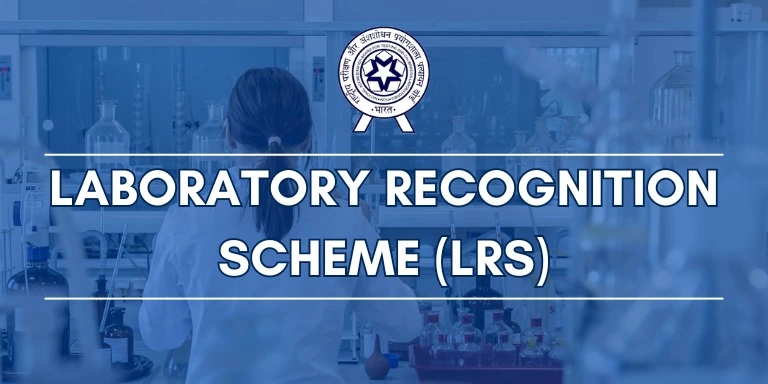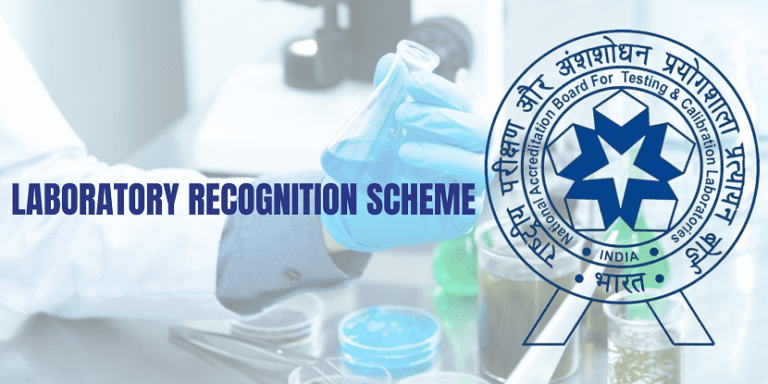INTRODUCTION

Under the Bureau of India Standards Act of 1986, the Indian national standards organization known as the Bureau of India Standards (BIS) was launched. The BIS runs a system of product certification to safeguard consumer interests. Following the program, BIS grants licenses to producers that can consistently produce items under applicable Indian requirements. The provision of the relevant test facilities is vital since the test serves as an essential complement to the evaluation of the product’s quality. To handle the testing of samples produced by its product certification system, BIS created a network of eight internal laboratories around the nation.
Brief Of LRS
The Laboratory Accreditation Scheme is a type of compliance evaluation to ensure that the laboratory’s standards satisfy those required by the Bureau of Indian Standards (BIS). For laboratories both inside and outside of India, there is a specific scheme called the BIS Laboratory Recognition Scheme. For laboratories to adhere to the BIS’s strict criteria, such a plan is necessary. The Indian Standards Bureau should be consulted to assure this type of conformity evaluation.
The Laboratory Recognition Scheme, which acknowledges several types of laboratories in India and abroad, is run by the Bureau of Indian Standards (BIS). The BIS Act of 2016 and the BIS Regulations provide legislative provisions for the functioning of this system in sections 13(4) and 32, respectively. This guarantees that laboratories inside and outside of India adhere to the established standards for laboratory testing and sampling techniques.
The governance of labs is established under the BIS Act of 2016 and the BIS Rules of 2018. This covers the prerequisites for applications and other procedural elements of laboratories inside and outside of India.
Principles Of LRS
The laboratory accreditation system’s goals are as follows:
- Make that Indian laboratory adhere to the requirements for foreign certification.
- To make sure that when certification is given to laboratories, conformity assessment procedures are followed.
- Numerous testing facilities are being developed through various projects.
- to guarantee that testing laboratories both inside and outside of India adhere to particular rules.

Qualification Standards for the Laboratory Recognition Program
The following qualifying requirements must be met before applying for this program:
Accreditation: The lab must first receive accreditation from a body authorized by the Bureau of Indian Standards. The requirements outlined in IS/ISO/IEC 17025 for laboratory quality management systems must be met for such accreditation. For this type of accreditation, laboratories need to be acknowledged both domestically and globally. The following organizations can accredit the laboratory:
- Cooperation in International Laboratory Accreditation (ILAC)
- Cooperation on Asia-Pacific Laboratory Accreditation (APLAC)
- Any other regional organization that provides this kind of accreditation
if accessible To complete the aforementioned accreditation procedure, all BIS requirements must be satisfied.
Norms of India: Indian Recognition Standards must be followed for recognition to be granted. This is important to keep in mind while examining various conformity evaluation systems within the BIS framework. There are a few caveats or exemptions to this, though:
- The laboratory will not be accepted if it lacks the equipment to conduct the aforementioned test. When deciding who receives a laboratory recognition program award, all factors on the material in the lab are taken into account. Documentary proof may be required for some examinations. However, it’s not necessary.
- Each exclusion will be evaluated individually. There are, however, some types of disqualification that would be chosen based on merit.
- Labs that are subject to such exclusions must make this clear in their application. Depending on the nation, a specialist examination may be used as the foundation for a recognition decision. • The requirements for laboratory approval must be followed. The testing must adhere to the standards established by ISO. Under this plan, outsourcing testing is not permitted.
- The laboratories’ operations would take place in the same location. The fire behavior of fire extinguishers, short-circuit testing for transformers, photometric testing for LED lights, and EMI/EMC testing for the safety of home appliances may be the exceptions when buildings are utilized to conduct tests as part of laboratory approval.
Objectivity: The laboratory recognition system’s standards for IS/ISO/IEC 17025 must adhere to the following:
- None of the laboratory’s operations are impacted. This implies that actions taken in the lab must be done impartially.
- Lab management must be unbiased. In managing the laboratory’s operations, all financial and commercial activities must be carried out in line with the specifications of the aforementioned rule. The laboratory must employ a risk identification procedure.
- This would guarantee that all potential dangers to impartiality are recognized and reduced. The laboratory must pledge or declare its impartiality to support it. The Laboratory Approval System’s Pledge of Impartiality was signed by all managers and directors.
Procedures to Apply for the Laboratory Recognition Scheme
When applying for the Laboratory Recognition Scheme, the following process must be taken into account:
- First, complete the application: the applicant must make sure they meet the requirements for the laboratory recognition program. After verification, the applicant must fill out the application form (BIS/LRS/F-01) with specific information. Along with this, the payments and paperwork must be filed.
- Details of the application form: The application form must be completed according to the instructions. The application form must be filled out and submitted by the company’s key management. Therefore, the CEO must complete the application for a private or public corporation. The owner must fill out the application if the applicant is a real estate firm. The applicant’s signature on the application form must be readable, as well as their name and title. A certificate on business paper is required if the application is signed by the authorized signatory. The management’s official signature must appear on the letterhead (key executive).
- Making the Application Submission: The application must be presented at the authorized laboratory of the BIS with case-handling authority, and it must meet all criteria and standards.
- Receipt of Application: Applications for the Laboratory Recognition System will be evaluated to see if the requirements fulfill the standards after being submitted to the BIS Laboratories.
- Application observed: The application would be recorded for future processing if it met the conditions. The following would be noted about the application:
- The registered application has been approved. There would be a specific identifying number (application number) given. Future communications between the laboratory and BIS should include the application number.
- The documents would be evaluated following the specifications.
- The laboratory is notified if there are any problems with the documentation.
- The laboratory would have 10 days to respond to the BIS with the appropriate documentation.
- The application will continue to be handled after the papers are received.
- The request will be denied if the papers are not supplied when asked by the BIS.
- Subsequent registrations cannot be reimbursed once they have been submitted.
- Site Analysis: For the laboratory reconnaissance program, a preliminary site assessment would be carried out. To make sure the laboratory complies with requirements, an on-site audit is necessary. Such audit specifications would be recorded. The laboratory accreditation system’s levels for the following categories are subject to review:
- Reviewers would be chosen under BIS criteria.
- The laboratory would get information about the audit team within seven days.
- The BIS would typically conduct the check 15 days after receiving such certification.
- The laboratory is responsible for paying the expenses associated with carrying out the audit.
- The laboratory is responsible for carrying out travel procedures.
- The laboratory is in charge of meeting the criteria of the auditors.
- Acceptance Decision: The auditors would determine if the laboratory was by the rules for the laboratory approval scheme after completing a pre-audit. The laboratory must abide by the rules if they have authorized the certification of the facility.
- Application Submission Processing: The recognition application would be the last stage. The actions would be as follows:
- The investigation would show if the laboratory satisfies the requirements for recognition.
- Any limitations on criteria and grades are also indicated.
- The application specifies any exceptions for exams.
- The laboratory recognition system’s certificate would be good for three years.
- The amount of the applicant’s fee will determine this. Within 14 days of receiving the confirmation letter, the money is due.
- The BIS will decline the recognition if it does not receive the money for the laboratory recognition system.
- The recognition would go into effect when the sentence was realized.
Documents Necessary
The following paperwork has to be submitted to prove the laboratory’s legal identity:
- Articles of Association and the Memorandum of Association
- In the event of a partnership or limited liability business, the Memorandum of Association
- Chartered Accountant’s Certificate for the Incorporation of a Sole Proprietorship
- An affidavit signed by a sole proprietorship and written on paper with a non-judicial stamp worth Rs. 100. Public Stores and Establishments Act Registration Certificate must notarize such an affidavit.
- GST Registration Document
- Legal Identity Compliance with Government Regulations
- A Certificate of Authenticity and Compliance must be provided by the government of the foreign laboratory’s nation.
Conclusion
Whatever industry you’re in or the sort of product you intend to introduce in India, Induce India has experience in offering LRS certifications for all products on the ISI/BIS certification list. Additionally, our professionals will help you with every step.
Free Call Back
Contact
- 101, Khudi Ram Bose Marg, Pratap Nagar, Mayur Vihar, New Delhi, Delhi, 110091
-
011-203116227
+91-7503304082 - [email protected]
Brochure
INDUCE INDIA official brochure to explore about all the services and products. Please download to explore.
